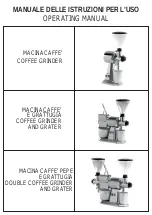
Milk texturing is the steaming of milk. The
steam does two things, firstly it heats the
milk and secondly the steam mixes air
with the milk to form an ‘emulsion’ of tiny
bubbles that gives a silky velvet texture.
Similar to making an espresso, perfecting the
art of milk texturing takes time and practice.
Tip: Remember espresso is the foundation
for all café style drinks and the milk is the
variable.
Before starting to prepare for milk texturing,
ensure the espresso machine is in steam
mode, so the red light on the power button
and orange light on the steam button are
illuninated.
Note: Should the espresso machine not
be in steam mode, so the orange light on
the steam button is not on, the coffee
maker needs to press the steam button to
activate the steam mode.
1. Determine how much milk is needed
based on the number of cups being made
or the size of the texturing jug.
Tip: Keep in mind that the volume of milk
will increase or ’stretch’ during the texturing.
2. Pour cold refrigerated milk into a
stainless steel jug, between ½ to ²/³ full.
Tip: Store the stainless steel jug in the fridge
so that it is well chilled. Also be sure not to
rinse the jug with warm water before use.
3. Purge the steam wand of any water.
With the steam wand positioned over the
drip tray activate the steam function by
turning the operating dial to the steam
setting (25). Once any water has been
purged close the steam by turning the
operating dial to the off position (26).
4. Swing the steam wand to the side of the
espresso machine (27).
5. Place the steam wand into the milk so
that the nozzle is about a centimetre
below the surface and activate the steam
function by turning the operating dial to
the setting (28).
6. Angle the jug so that the steam wand is
resting on the spout of the jug and lower
the jug until the tip of the steam nozzle
is just below the surface of the milk. This
will start to create a whirlpool action in
the milk (29).
Note: Do not allow the steam to spurt
unevenly or it will create aerated froth/large
bubbles. If this is happening raise the jug so
that the steam nozzle is lowered deeper into
the milk. Remember the ideal consistency is
a silky velvet texture.
7. As the steam heats and textures the milk,
the level of the milk in the jug will begin
to rise. As this happens follow the level
of the milk by lowering the jug, always
keeping the tip of the steam nozzle just
below the surface.
8. Once the foam is created raise the jug
until the steam nozzle is in the centre of
the milk (30).
Tip: The amount of foam required will vary
depending on the drinks being made, for
example a cappuccino requires more foam
than a flat white.
9. Close the steam immediately when the
milk is heated to between 60-65°C by
turning the operating dial to the off
position (31).
Tip: If you don’t have a thermometer a good
indication that the correct temperature has
been reached is when you are unable to leave
the palm of your hand against the side of the
jug for more than 3 seconds.
Important: Do not boil the milk.
10. Remove the jug, immediately wipe the
steam nozzle and wand with a clean damp
cloth (32) and purge a small amount of
steam.
Guide to milk texturing
17
Summary of Contents for Cafe Latte EM5600
Page 30: ...Notes...














































